|
|
|
Sort Order |
|
|
|
Items / Page
|
|
|
|
|
|
|
| Srl | Item |
| 1 |
ID:
130062
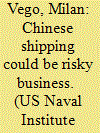

|
|
|
|
|
| Publication |
2014.
|
| Summary/Abstract |
Although their economy is increasingly dependent on maritime trade, China lacks the ability to protect its shipping-a dangerous reality should they find themselves in a major war at sea.
China's greatest strength is at the same time its greatest weakness. With the second largest global economy, about 60?70 percent of China's economic activity today is directly or indirectly linked to trade with other nations. 1 In 2011 85 percent of China's total trade was by sea. 2 In this regard, the country is increasingly dependent on maritime trade-and the security of its sea lanes-for its economic vitality, high standard of living, and military strength.
|
|
|
|
|
|
|
|
|
|
|
|
|
|
|
|
| 2 |
ID:
146631
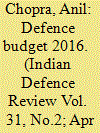

|
|
|
|
|
| Contents |
March 2016 was an eventful month for the Indian Air Force (IAF) on many counts. The Indian defence forces were still recovering from the lower than expected increase in the defence allocation in Budget 2016-2017. In fact, the Finance Minister for the first time did not even mention the allocation for defence in his speech in the Parliament. With dithering modernisation, the capital fund allotments were considered rather meagre. The IAF’s Exercise Iron-Fist 2016 on March 18 was the largest ever show of air power. In spite a great event, there were a few clearly visible weapons misses that were critically talked about.
|
|
|
|
|
|
|
|
|
|
|
|
|
|
|
|
| 3 |
ID:
146228
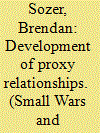

|
|
|
|
|
| Summary/Abstract |
Proxy warfare is a consistent element in international warfare. However, it is unclear why proxy relationships form in cases where states have multiple options of groups to support. Existing research identifies the presence of transnational constituencies, shared interstate rivalries, and moderate relative strength of militant groups as highly influential on the development of a proxy relationship. This study examines the presence of these variables within the context of the Lebanese Civil War. The results of this demonstrate that each state places greater importance on some variables and ignores others when choosing a proxy. Additionally, this study further demonstrates the presence of new variables that are key to the development of proxy relationships.
|
|
|
|
|
|
|
|
|
|
|
|
|
|
|
|
| 4 |
ID:
103941
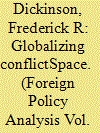

|
|
|
|
|
| Publication |
2011.
|
| Summary/Abstract |
Developments in East Asia strengthen the claims of "ConflictSpace." The contrast between general war in 1914 and the limited Sino-Japanese War of 1894-1895 may be explained, in large part, by the higher degree of connectivity in 1914. The difference between Japan's swift declaration of war in 1914 and hesitation by China and the United States may, likewise, be attributed to Japan's higher connectivity. A host of independent variables, such as political will and relative military strength, can wreak havoc with the basic assumptions of ConflictSpace. But used cautiously as part of an ongoing discussion between social scientists and historians, ConflictSpace may effectively gauge the relative likelihood of the spread of war.
|
|
|
|
|
|
|
|
|
|
|
|
|
|
|
|
| 5 |
ID:
104703
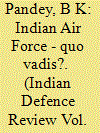

|
|
|
| 6 |
ID:
110987


|
|
|
|
|
| Publication |
2012.
|
| Summary/Abstract |
As the Myanmar government continues to promote its new, conciliatory image, the refusal of the Kachin Independence Army (KIA) to capitulate is proving a major abstacle.
|
|
|
|
|
|
|
|
|
|
|
|
|
|
|
|
| 7 |
ID:
087002
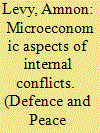

|
|
|
|
|
| Publication |
2009.
|
| Summary/Abstract |
This exploratory paper outlines the special macroeconomic features of countries populated by two groups of people engaged in internal conflict yet forming a central government for generating benefits that cannot be privately attained. Each group exerts an influence on the central government in accordance with its relative military strength. The central government collects taxes, exports the country's natural resources and tourist attractions, attracts external grants and loans, and distributes the net revenues between the rival groups. The paper highlights the implications of the groups' investment in military strength for the state's net revenues and their distribution, for the state's external debt, and for the groups' ability to maintain and increase their ranks, production capital and per capita income.
|
|
|
|
|
|
|
|
|
|
|
|
|
|
|
|
| 8 |
ID:
101549


|
|
|
|
|
| Publication |
New Delhi, Prashant Publishing House, 2011.
|
| Description |
368p.
|
| Standard Number |
9789380565132, hbk
|
|
|
|
|
|
|
|
|
|
|
|
Copies: C:1/I:0,R:0,Q:0
Circulation
| Accession# | Call# | Current Location | Status | Policy | Location |
| 055603 | 355.033051/SHI 055603 | Main | On Shelf | General | |
|
|
|
|
| 9 |
ID:
175939
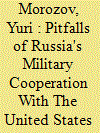

|
|
|
|
|
| Summary/Abstract |
This article analyzes relations between the leading world powers (the United States, China, and Russia) with respect to problems of global and regional security, along with the American and Chinese approaches to them. Prospects for creating a military and political alliance between Russia and China are considered as well. The author identifies possible ways of resolving the considered problems in the context of a Russia-China-US "strategic triangle."
|
|
|
|
|
|
|
|
|
|
|
|
|
|
|
|
| 10 |
ID:
103672


|
|
|
|
|
| Publication |
2010.
|
| Summary/Abstract |
Anniversaries are occasions for celebration and for taking stock of past problems as well as successes as a basis for looking ahead. But it is important to acknowledge first the enormity of the achievements of the People's Republic. The sixtieth anniversary has been marked in Beijing by a display of China's military strength and its wealth. The "sick man" of Asia of a century ago has been transformed into one of the world's economic power-houses. Hundreds of millions of people have been lifted out of poverty. The Chinese economy ranks as the largest in the world. It has become one of the world's greatest trading nations and its influence is growing in every continent. However, in assessing the significance of these sixty years this paper will focus on three themes: history; foreign relations and future prospects.
|
|
|
|
|
|
|
|
|
|
|
|
|
|
|
|
| 11 |
ID:
091634
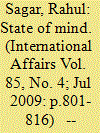

|
|
|
|
|
| Publication |
2009.
|
| Summary/Abstract |
As its economic power, military strength and cultural influence expands, India draws ever closer to becoming a leading player in world politics. Yet relatively little is known about what Indians take to be the nature of international politics and, correspondingly, how their power and influence should be used. A survey of Indian political thought reveals sharp disagreements. Moralists wish for India to serve as an exemplar of principled action. Hindu nationalists want Indians to act as muscular defenders of Hindu civilization; strategists advocate cultivating state power by developing strategic capabilities; and liberals seek prosperity and peace by increasing trade and interdependence. This article argues that current trends indicate that India will increasingly prioritize its quest for prosperity and peace. But if this quest is thwarted by external threats, then calls to enhance India's military power will most probably grow louder, and be heeded more closely.
|
|
|
|
|
|
|
|
|
|
|
|
|
|
|
|
| 12 |
ID:
128032
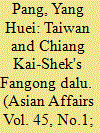

|
|
|
|
|
| Publication |
2014.
|
| Summary/Abstract |
For much of the 1950s, ROC President Chiang Kai-shek tried to formulate viable "counteroffensive" plans to reclaim mainland China. A main part of this vision was to attract US military sponsorship; for the ROC conspicuously lacked the military strength to reconquer mainland China. However, the formulation of these plans had unintended results for Taiwan. Firstly, the military plans gave Chiang's subordinates an indirect way of stating the impossibility of returning to mainland China, while strenuously proclaiming their loyalty. Secondly, Chiang Kai-shek's admonishment "????" Wu Wang Zai Ju (Forget Not the time at Ju), the clarion call for the ROC's mainland counter offensive, unwittingly promoted a more sedentary form of national identity for the average Taiwanese. Finally, the more Taiwan developed economically by means of US aid, the more the Taiwanese silently distanced themselves from Chiang's Quixotic dream of reclaiming mainland China. Thus, Chiang's leadership in "counteroffensive" planning did more to distance the island state from the mainland than "reclaim" it.
|
|
|
|
|
|
|
|
|
|
|
|
|
|
|
|
| 13 |
ID:
139026


|
|
|
|
|
| Summary/Abstract |
The debate over national-security strategy in Washington is seemingly bracketed by two similar choices: sustaining American primacy and expanding American primacy. This fixation is remarkably arrogant, unnecessarily ambitious and unsustainably expensive; it has done, and will do, little to improve the lives of the great majority of the country’s citizens.
|
|
|
|
|
|
|
|
|
|
|
|
|
|
|
|
|
|
|
|
|